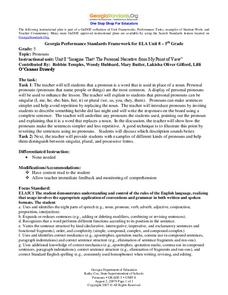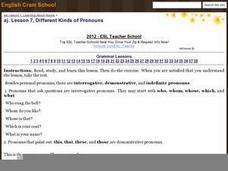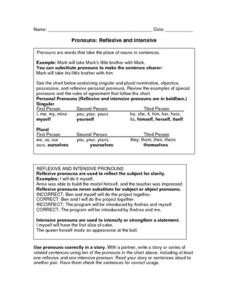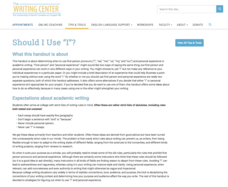Curated OER
Pronouns
Fifth graders study pronouns. In this grammar lesson, 5th graders discuss what a pronoun is and write what they did last night using pronouns.
K12 Reader
Special Singular Pronouns
As everybody knows, pronouns must match their antecedents. Except for those special ones like everybody, neither, one and several others. These exceptions are the focus of a short instructional activity that first models the...
Curated OER
Subject Object Pronoun Practice
Practice substituting subjects and objects in a sentence with the correct pronouns. A grammar worksheet prompts young learners to fill in the blanks for ten missing subjects, and then ten missing objects in different sentences.
Curated OER
Pronouns
Pronouns are a very common part of speech. Young readers are exposed to words such as: he, her, I, we, they, and she. They realize that a pronoun can replace the name of a person, or an object. The last slide challenges pupils to work...
Curated OER
Personal Pronouns
In this personal pronoun interactive learning exercise, students watch a video entitled, "Now Here's A Song." They complete 9 sentences with the personal pronoun that replaces the words in parentheses. They submit their answers using the...
Curated OER
Personal Pronouns
In this online grammar worksheet, students read each of the 15 statements and complete each one with a personal pronoun.
Curated OER
Pronouns: Interrogative, Demonstrative, Indefinite
English language pronouns pose special usage challenges. The second session about them on EnglishCramSchool.com addresses interrogative, demonstrative, and indefinite pronouns. Aspiring grammarians review rules and information,...
LearnEnglishFeelGood.com
Reflexive Pronouns
Use this 10-question grammar worksheet to assess, practice, or review reflexive pronouns where learners will read sentences and fill in the blank with the corresponding reflexive pronoun.
Curated OER
Test Your Grammar Skills: Personal and Possessive Pronouns
In this personal pronouns and possessive pronouns worksheet, students fill in the gaps with the missing pronouns. Student then identify the kind of pronoun.
Curated OER
Direct and Indirect Object Pronouns
After mastering direct and indirect pronouns, learn the correct sentence structure for having both in the same sentence. This resource provides explanations and clear examples. Consider printing this reference guide on a colored piece of...
Curated OER
Subject Personal Pronouns and Possessive Determiners
In this subject personal pronouns and possessive determine worksheet, students fill in the blanks to sentences, and write the possessive determiner. Students complete 2 activities.
Web English Teacher
Reflexive and Intensive Pronouns
Myself. themselves, himself. Class members engage in an intensive study and reflect on the uses of reflective and intensive pronouns.
Curated OER
Pronoun Shift
Pronouns, and their appropriate use, are the focused on in this resource. Students see that there are first, second, and third-person pronouns. After viewing the presentation, students try their hand at identifying mistakes (if any) in...
Curated OER
Using Personal Pronouns 1
In this grammar worksheet, students practice the correct use of the personal pronouns "I" or "me" by completing 15 sentences.
Curated OER
Personal Possessive Pronoun Practice
In this personal pronouns practice worksheet, students respond to 20 fill in the blank and 4 short answer questions regarding the use of yours, hers, ours, his, and theirs.
Curated OER
Cross Out Paragraph Puzzle One: To Keep it Secret
Slightly confusing upon first glance, this lesson is actually a neat idea! Present your learners with a series of sentences (at the top of the page), and have them follow the directions to cross out adverbs, verbs in the past tense, etc....
Curated OER
Pronouns: Reflexive and Intensive
What is the difference between reflexive and intensive pronouns? To find out, review the definitions and examples for various types of pronouns. Then complete several activities that help the class learn to recognize and use pronouns....
University of North Carolina
Should I Use “I”?
Despite the formal nature of academic writing, personal pronouns frequently appear in high school and college papers. While your first instinct may be to cross them out, sometimes it's okay to use them, an idea covered in a handout that...
Curated OER
Who? What? Why? - Using Interrogative Pronouns
Interrogative pronouns are an important part of learning the interrogative sentence form. Middle schoolers learn about using interrogative pronouns in sentence writing, and use what they read to answer the nineteen questions on the...
Curated OER
Using Intensive Pronouns
Myself, yourself, and himself are intensive pronouns. Get your learners using these pronouns when writing sentences with this series of worksheets which include a reading and discussion section, examples, three practice activities, and...
Curated OER
English Exercises: Personal Pronouns
In this online interactive English instructional activity, students respond to 10 fill in the blank questions about pronoun agreement. Students may submit their answers to be scored.
Curated OER
Subject Pronouns in Spanish
Starting off with examples and explanations of English subjects and pronouns, this resource explores Spanish subject pronouns in great detail. Each subject pronoun is described and paired with examples. Additionally, the material...
University of North Carolina
Gender-Inclusive Language
In the past, if writers weren't sure of a person's gender, they simply used masculine pronouns. Today, however, as a handout on gender-inclusive language explains, writers must choose pronouns carefully. To promote the use of gender...
Curated OER
Relative Pronouns
What does a relative pronoun have to agree with in a sentence? If you said the its antecedent, you're right! Read the short explanation and study the examples at the top of the page. Then, decide which verb form matches the relative...

























